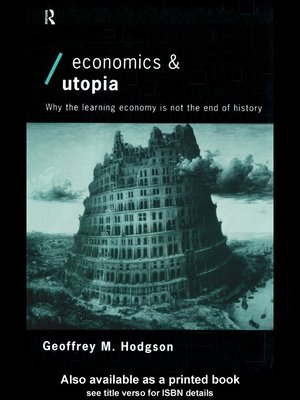Economics and Utopia
ebook ∣ Why the Learning Economy is Not the End of History · Economics as Social Theory
By Geoffrey M. Hodgson

Sign up to save your library
With an OverDrive account, you can save your favorite libraries for at-a-glance information about availability. Find out more about OverDrive accounts.
Find this title in Libby, the library reading app by OverDrive.



Search for a digital library with this title
Title found at these libraries:
| Library Name | Distance |
|---|---|
| Loading... |
For many, the East European revolutions of 1989 and the disintegration of the USSR represented not only the overdue demise of Soviet-style communism, but also the obsolescence of all utopian ways of thinking. History has reached its end-state in the form of a victorious liberal-democratic capitalism and all attempts to imagine an alternative social order were now damned as both futile and quixotic. Economics and Utopia rejects this stifling dogma in the belief that utopian thinking is a necessary condition for the development of alternative solutions to the problems of the present and thus for historical progress.
Economics and Utopia is emphatically not an attempt to breathe new life into existing utopian models, whether state socialist or neo-liberal, which are seen as misunderstanding the nature of learning and knowledge in a modern economy. The author's utopianism is based on an examination of the potential for an alternative future based on the growth of knowledge-intensive production, one whose feasibility would derive from its ability to respond to the needs of rapidly-changing industrial economies. More than just a consideration of economic alternatives, Economics and Utopia is also an important contribution to the critique of mainstream economics which is considered to be unable to understand the market system except in the most formal and abstract terms. Thus in order to imagine new worlds a change in our economic thinking is necessary, one that focuses on the relationship between learning and knowledge in economic systems, as well as on the institutional and cultural context of different economic models.
Economics and Utopia is emphatically not an attempt to breathe new life into existing utopian models, whether state socialist or neo-liberal, which are seen as misunderstanding the nature of learning and knowledge in a modern economy. The author's utopianism is based on an examination of the potential for an alternative future based on the growth of knowledge-intensive production, one whose feasibility would derive from its ability to respond to the needs of rapidly-changing industrial economies. More than just a consideration of economic alternatives, Economics and Utopia is also an important contribution to the critique of mainstream economics which is considered to be unable to understand the market system except in the most formal and abstract terms. Thus in order to imagine new worlds a change in our economic thinking is necessary, one that focuses on the relationship between learning and knowledge in economic systems, as well as on the institutional and cultural context of different economic models.







